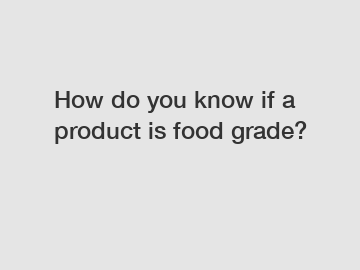How do you know if a product is food grade?
How do you know if a product is food grade? .
When you purchase food products or utensils, it is crucial to ensure their safety and suitability for use. With so many options available in the market, it can be challenging to determine whether a product is food grade or not. However, by understanding certain key aspects and looking out for particular features, you can confidently assess the grade of a product. In this article, we will discuss how to identify if a product is food grade, addressing various points to help you make informed decisions.
Point 1: Material Composition.

One fundamental criterion for determining food grade products is the material composition. Food-grade products are typically made from materials that do not pose a risk to human health. These materials are non-reactive and resistant to corrosion, ensuring that they do not introduce harmful chemicals or contaminants into the food. Common examples of food grade materials include stainless steel, glass, silicone, and certain types of plastic that are specifically designed for food contact.
Point 2: Regulatory Standards.
Every country has regulatory bodies that establish standards and guidelines regarding food safety. These standards often include specific requirements for food contact materials and packaging. To know if a product is food grade, look for certifications or labels that indicate compliance with these standards. For instance, in the United States, products that are deemed safe and suitable for food use are often marked with the FDA (Food and Drug Administration) logo or the NSF (National Sanitation Foundation) certification.
Point 3: Odor and Taste.
Food grade products should not have any strong odors or impart any taste to the food. If a product emits a noticeable smell or alters the flavor of the food, it may indicate the presence of chemicals or contaminants that can be harmful when ingested. It is advisable to thoroughly inspect the product, especially if it is used for food preparation or storage, and opt for odorless and tasteless options to prioritize food safety.
Point 4: Labeling and Packaging.
Proper labeling and packaging can also provide valuable information about a product's food grade status. Look for labels that explicitly state the product is food grade or safe for food contact. Additionally, pay attention to any instructions or warnings regarding the product's use, cleaning, and maintenance. Clear and comprehensive packaging that includes the manufacturer's information and details about the product's intended food applications can help you make an informed choice.
Point 5: Quality Assurance.
Reliable manufacturers often subject their products to rigorous testing and quality control measures before they reach the market. To ensure a product's food grade status, investigate the manufacturer's reputation and adherence to quality assurance practices. Reputable brands typically conduct extensive testing to confirm their products are safe for food use. Additionally, customer reviews and ratings can provide insights into the overall safety and quality of a product.
Point 6: Certification Programs.
Certain industries have established independent certification programs that validate the food grade status of products. These programs involve thorough assessments and testing to ensure the products meet specific standards. For example, the CertiPUR-US certification focuses on foam products, while the Kosher and Halal certifications cater to food products conforming to specific religious dietary requirements. Look for these certifications as they offer an additional layer of assurance regarding a product's suitability for food use.
In conclusion, determining if a product is food grade requires careful consideration of its material composition, compliance with regulatory standards, absence of odor and taste implications, proper labeling and packaging, quality assurance practices, and any relevant certifications. By thoroughly examining these factors, you can confidently identify and choose products that are safe and suitable for food use. Prioritizing food safety not only safeguards your well-being but also ensures that the products you utilize in your culinary endeavors meet the necessary standards for optimal health and enjoyment.
Contact us to discuss your requirements of coated aluminum coil suppliers, color coated aluminium coil wholesaler, aluminum roofing coil. Our experienced sales team can help you identify the options that best suit your needs.
176
0
0

Comments
All Comments (0)